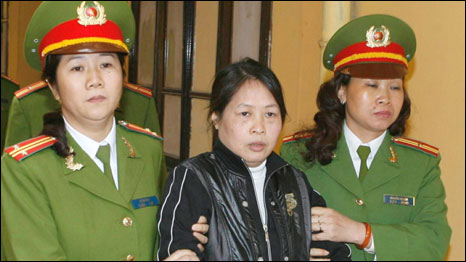The Wall Street Journal
July 20, 2010,
By Duy Hoang
Hillary Clinton can use her visit to Hanoi this week to press for freedom.
When U.S. Secretary of State Hillary Clinton arrives in Hanoi on July 22 for the Association of Southeast Asian Nations’ Regional Forum, she will step into a dynamic country where the vast majority of people want a forward-looking political and economic relationship with America. With diplomatic ties fully normalized after 15 years of bilateral effort, Mrs. Clinton now needs to focus on next steps. It will be helpful if U.S. policy toward Vietnam is mindful of what’s in the long-term interest of both countries—a free and modern Vietnam.
On the economic front, Vietnam is gradually ditching a failed centrally planned economic model. But the Communist Party remains insistent on monopolizing political power. The inherent contradictions between an open economy and closed politics play out in many ways, some of which affect American business interests. Corruption remains a serious problem, for instance, which an unfree press struggles to police and for which an unfree public can’t hold officials accountable. By pushing for greater openness, Mrs. Clinton can help both Vietnamese and Americans.
One way would be for Mrs. Clinton to bring to Vietnam a message she has carried elsewhere: the importance of Internet freedom. Internet use in Vietnam has grown exponentially in the last decade, with some 25 million people now online. But Vietnam’s netizens, many of whom are young and restless, are facing increasing censorship. A directive by the People’s Committee of Hanoi issued in April requires all retail establishments providing Internet services, such as hotels and cafes, to install monitoring software and report user violations to authorities. These broadly defined violations include “abusing the Internet” to oppose the government, disclosing national secrets or providing so-called distorted information. Meanwhile, those who want to use Facebook and other social-networking sites must circumvent censorship attempts because the Ministry of Public Security has ordered local Internet service providers to block access.

These Internet restrictions, which Vietnamese face everyday, run counter to the Hanoi government’s stated objective of developing a knowledge-based economy. They also interfere with U.S. programs to support higher education in Vietnam. One oft discussed project, creating American-style universities in Vietnam, would be meaningless without unfettered access to information.
Besides calling on her hosts to repeal Internet censorship, Mrs. Clinton could also advance human rights in Vietnam byjoin members of the U.S. Congress in calling for the release of Vietnamese rights activists, including three prominent women: novelist Tran Khai Thanh Thuy, lawyer Le Thi Cong Nhan and cyber-activist Pham Thanh Nghien. The case of Ms. Thuy is of particular concern to anyone who has a stake in an open and fair Vietnam legal system. According to eyewitnesses, she was beaten by police at her home in October 2009, apparently in retaliation for attending the trials of fellow activists. She was then charged with assault. State media published a picture of a bloodied man that the 5-foot-tall Ms. Thuy supposedly assaulted. Vietnamese bloggers proved, however, that the picture was taken in 2005 and photoshopped to appear to have happened at the time of the incident. Ms. Thuy was sentenced to three and a half years in jail on the phony charge.
Ms. Nhan is a human rights lawyer currently under house arrest for advocating multiparty democracy. Prior to her arrest, she analyzed how a decree granting security police the power to detain citizens for years without trial violated Vietnam’s Constitution. Ms. Nghien got in trouble with police for attempting to organize a peaceful demonstration against the Beijing Olympic Torch Relay in 2008 and later for publicizing the plight of Vietnamese fishermen attacked by Chinese navy vessels in a disputed area of the South China Sea that historically belonged to Vietnam. She was imprisoned for her public opposition to government policies toward China.
Mrs. Clinton’s visit is an opportunity to raise these specific cases. While some observers view the current crackdown by Hanoi as a precursor to next January’s Communist Party Congress and therefore something that just has to be tolerated, the Vietnamese authorities are not immune to outside pressure. Hanoi craves a visit by President Obama later this year along with the granting of economic carrots like the Trans Pacific Partnership. The regime has made some improvements in the past on issues like religious freedom in response to criticism from the U.S., although those have often proven fleeting as soon as the pressure eases. This suggests that if Mrs. Clinton makes an issue of Hanoi’s rights record—and then Washington keeps up the pressure—she can do some good for Vietnam.
It may seem inconvenient to raise such sensitive issues. But it would be short-sighted to take a narrow view of America’s interests in the region and the best way forward for U.S.-Vietnam ties. With 86 million people and so much economic promise, Vietnam has the potential for anchoring a more prosperous and liberal region. But this requires the participation and empowerment of the entire country, not just a privileged elite. Mrs. Clinton’s visit is a chance to work toward that goal.
Mr. Hoang is a U.S.-based leader of Viet Tan, an unsanctioned pro-democracy political party in Vietnam.
Source: Wall Street Journal





